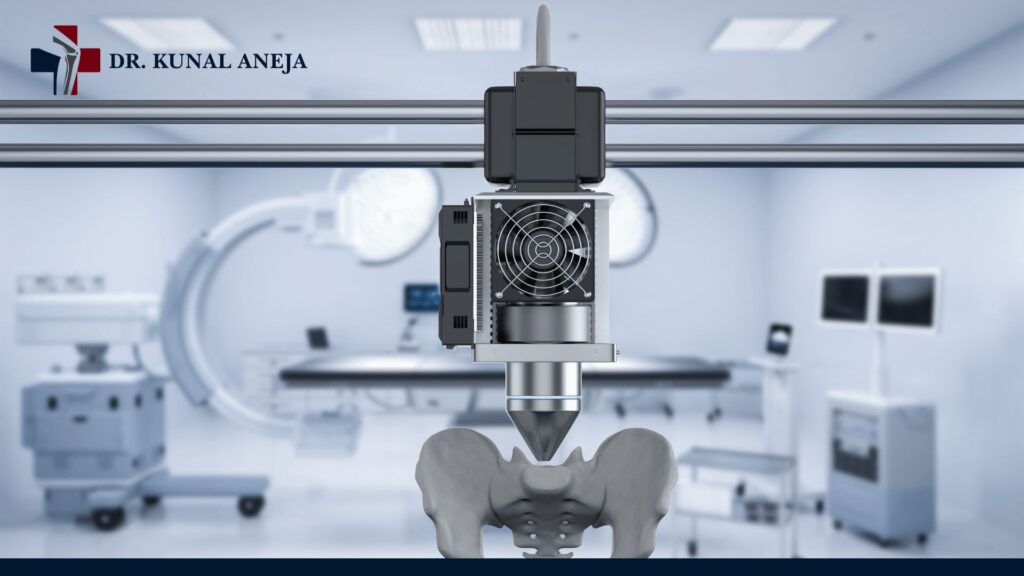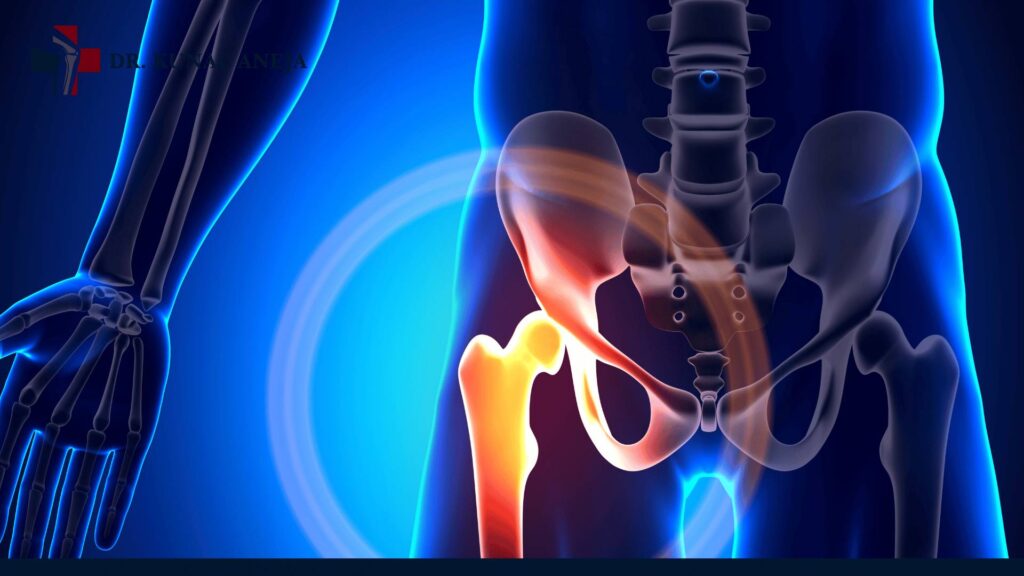Overview
Imagine waking up one morning with the simple goal of tying your shoelaces, only to find your hips protesting with sharp, relentless pain. Gradually, everyday tasks like walking, sitting, or climbing stairs turn into uphill battles. If this sounds familiar, it’s time to seek help. With expert care from the best Hip Replacement Surgeon in Delhi, life can return to normalcy. Specialists like Dr. Kunal Aneja combine advanced techniques with compassionate care to restore not just movement but also the joy of living pain-free.

What are the common signs that you might need hip replacement surgery?
Identifying the right time for surgical intervention is critical. Here are the key indicators:
- Chronic Pain: Persistent pain in the hip, groin, or thigh, even while resting.
- Limited Mobility: Difficulty in walking, bending, or performing routine tasks.
- Stiffness: Reduced range of motion that worsens over time.
- No Relief from Medications: Painkillers and physiotherapy fail to provide lasting comfort.
Recognizing these symptoms early can prevent further complications and ensure timely treatment.
How Can Hip Replacement Surgery Restore Your Mobility and Quality of Life?
Hip replacement is more than just a medical procedure; it’s a life-altering solution. Here’s how it helps:
- Pain Elimination: Removes the source of chronic discomfort.
- Restored Functionality: Enables you to walk, sit, and move freely.
- Improved Sleep: Reduces pain-related disruptions, enhancing rest.
- Enhanced Quality of Life: Reclaims the freedom to engage in activities you love.
The transformation is profound, allowing patients to regain control of their lives.
What Should You Look for in the Best Hip Replacement Surgeon in Delhi?
Choosing the right surgeon can feel overwhelming. Use this checklist to make an informed decision:
- Certifications and Training: Look for global expertise and board certifications.
- Specialization: Focus on surgeons with extensive experience in hip replacements.
- Patient Reviews: Positive testimonials highlight trustworthiness and success rates.
- Technology Adoption: Advanced methods like robotic-assisted surgery show commitment to excellence.
- Hospital Affiliations: Ensure the surgeon is associated with reputable healthcare institutions.
Dr. Kunal Aneja, with his global training and exceptional patient outcomes, exemplifies these qualities.

What are the Different Types of Hip Replacement Procedures, and Which Is Right for You?
Understanding your options empowers you to make better decisions. Here’s a quick comparison:
| Procedure | Description | Ideal For |
|---|---|---|
| Total Hip Replacement | Replaces the entire joint with an artificial one. | Severe arthritis or joint damage. |
| Partial Replacement | Replaces only the damaged part of the joint. | Fractures or localized damage. |
| Minimally Invasive Surgery | Uses smaller incisions for quicker recovery. | Patients seeking reduced downtime. |
A surgeon’s recommendation will depend on your condition, lifestyle, and overall health.
How Safe is Hip Replacement Surgery, and What Can You Expect During the Process?
Safety is a top priority in modern medical practices. Here’s what you need to know:
- Pre-Surgery Preparation: Includes physical exams, imaging tests, and tailored plans.
- Anesthesia: Administered to ensure a painless procedure.
- Surgery Duration: Typically lasts 1-2 hours.
- Post-Surgery Monitoring: Ensures a smooth recovery process.
With advancements like robotic navigation, risks are minimized, and success rates are significantly higher.
What Should You Know About Post-Surgery Recovery and Rehabilitation?
Recovery is a crucial part of the journey. Here’s a roadmap:
- Immediate Post-Surgery: Hospital stay of 2-4 days for initial healing.
- Physiotherapy: Guided exercises to strengthen muscles and improve mobility.
- Lifestyle Adjustments: Avoid strenuous activities during the initial months.
- Follow-Up Appointments: Regular check-ups to monitor progress.
Staying committed to the recovery plan ensures long-term success.
How Can Hip Replacement Surgery Help Prevent Future Complications?
Timely intervention isn’t just about addressing current pain—it also prevents:
- Joint Deformity: Caused by prolonged wear and tear.
- Fractures: Weak bones are more susceptible to breaks.
- Adjacent Joint Issues: Misalignment can lead to secondary problems in knees or back.
By acting early, you can protect your overall musculoskeletal health.
Why is Dr. Kunal Aneja the Best Hip Replacement Surgeon in Delhi?
Dr. Aneja’s unparalleled expertise and patient-first approach make him a top choice. Here’s why:
- Global Training: Expertise honed across premier institutions in Australia, the UK, and beyond.
- Advanced Techniques: Mastery in robotic and minimally invasive surgeries.
- Patient Success Stories: Numerous testimonials affirm life-changing results.
- Holistic Care Philosophy: His motto, “Life is movement, Movement is Life,” reflects his commitment to restoring vitality.
Choosing Dr. Aneja means entrusting your care to one of the finest professionals in the field.

Conclusion
Hip pain can feel like a roadblock, but it doesn’t have to define your life. Seeking help from the best Hip Replacement Surgeon in Delhi can pave the way to a pain-free future. Dr. Kunal Aneja combines advanced techniques with personalized care to ensure you’re not just treated but truly healed. Take the first step toward recovery and embrace a life of renewed movement and freedom.
FAQs
1. Is hip replacement surgery painful?
Ans. While some discomfort is expected immediately after the surgery, modern pain management techniques, including medications and minimally invasive procedures, help significantly reduce pain during recovery.
2. How long does it take to recover from hip replacement surgery?
Ans. Most patients can resume normal activities within 6–12 weeks, but complete recovery, including regaining strength and flexibility, may take up to 6 months. Individual recovery times vary based on age, health, and adherence to rehabilitation.
3. What are the risks associated with hip replacement surgery?
Ans. Hip replacement surgery is generally safe, but like any procedure, it carries risks such as infection, blood clots, or implant-related issues. Choosing an experienced surgeon, like Dr. Kunal Aneja, significantly minimizes these risks.
4. Are robotic and minimally invasive hip replacement surgeries better?
Ans. Yes, advanced techniques like robotic and minimally invasive surgeries offer benefits such as smaller incisions, less tissue damage, quicker recovery times, and improved implant precision.
5. How do I prepare for a consultation with a hip replacement surgeon?
Ans. Prepare by gathering your medical history, a list of medications, and any imaging reports like X-rays or MRIs. Also, write down your symptoms, concerns, and questions to ensure an informed discussion during the consultation.

